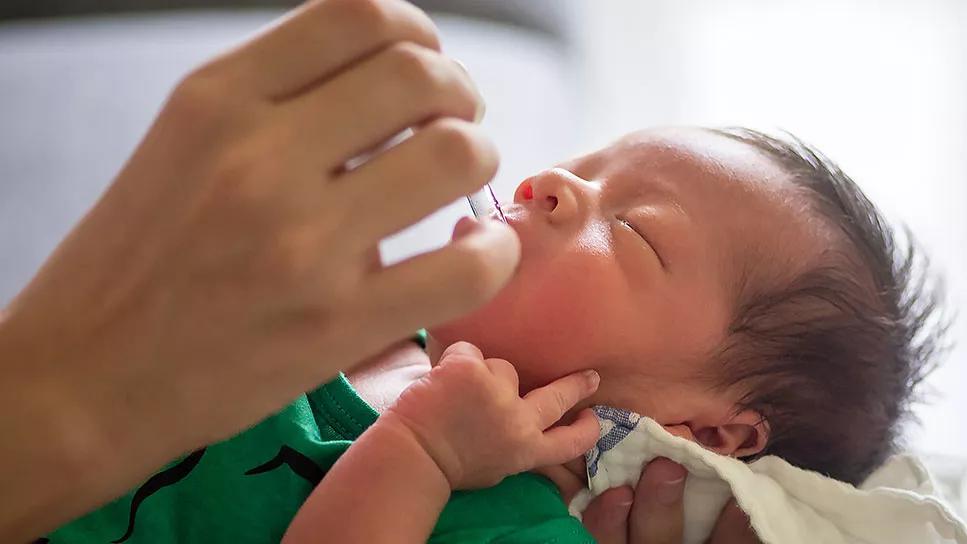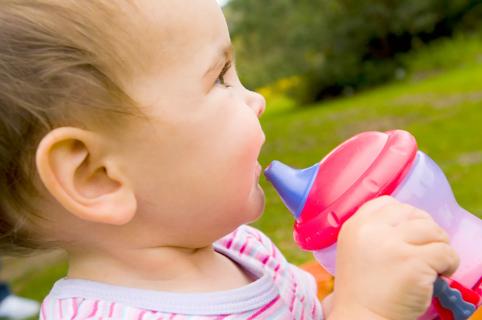A daily dose of vitamin D can help babies build strong bones, as well as boost their brain development

When it comes to making a shopping list for your infant, vitamin D drops deserve a spot at the top.
Advertisement
Cleveland Clinic is a non-profit academic medical center. Advertising on our site helps support our mission. We do not endorse non-Cleveland Clinic products or services. Policy
Vitamin D is crucial for your baby’s bone health and development, among other benefits. But many infants — particularly those who breastfeed — won’t get enough vitamin D without some supplementation.
But meeting your baby’s vitamin D needs is easy enough, explains pediatrician Kylie Liermann, DO. Here’s what you need to know.
Bones give your body structure — and that structure needs to be strong, given the wear and tear we put on our bodies. Bone mass built during childhood can help you out for your entire life, too.
So, what might happen if your child doesn’t get enough vitamin D? Well, a vitamin D deficiency can lead to rickets, a disease where bones can turn soft enough to warp, bend or break.
“Vitamin D helps the body absorb calcium and utilize it to form and strengthen bones and teeth,” says Dr. Liermann. “Without enough vitamin D, a child is more prone to fractures and growth problems.”
But bone health isn’t the only advantage vitamin D offers little bodies. Infants also need vitamin D to boost brain development and their immune system. “Vitamin D is necessary for so many functions,” says Dr. Liermann.
All babies are better off getting vitamin D drops in their first few days and weeks of life. After that, the need depends on how (or how much) your baby is feeding.
Advertisement
Infants who breastfeed need extra vitamin D. The reason? Despite the numerous health benefits of breast milk, research shows that it’s lacking in vitamin D, explains Dr. Liermann.
“Babies get minimal, if any, vitamin D from breast milk,” she says.
Formula, on the other hand, is fortified with vitamin D. Your baby will get all the vitamin D they need from formula IF they’re drinking enough of it. The target for that is 32 ounces of formula per day.
“But newborns usually don’t consume enough formula to get the recommended daily amount of vitamin D,” continues Dr. Liermann. “They’ll need a vitamin D supplement until they’re taking enough formula.”
It often takes a few months for babies to build up to taking 32 ounces of formula per day, though the timing is different for every child. (Learn more about feeding your newborn during their first year.)
Vitamin D deficiency is considered a worldwide health issue, with about 1 billion people having low levels of the vitamin. That’s a number that touches all ages and ethnicities.
When it comes to children, the available data on vitamin D deficiency is startling. Research shows that 50% of children ages 1 to 5 and 70% of kids ages 6 to 11 in the United States have vitamin D deficiency.
The deficiency often isn’t easy to notice in babies and young children, partly because they can’t tell you how they’re feeling. Fatigue and muscle pain are common symptoms of vitamin D deficiency.
Your healthcare provider may check your baby’s vitamin D levels if your child has:
The answer to this sounds confusing and complicated, but don’t worry — manufacturers make it easy to give your baby the proper amount of vitamin D.
Let’s start with the specifics. Children need 400 IU of vitamin D every day during their first year of life, according to various agencies and organizations (including the American Academy of Pediatrics).
But given that most folks aren’t familiar with IU as a measurement unit, that number probably means little to you. (IU is short for “international units” and is used in pharmacology. It doesn’t translate well to a measuring spoon in your kitchen drawer.)
Now the good news: Infant vitamin D supplements typically have this amount in one dose. Just fill to the recommended line and give it to your baby!
Be mindful, though, that different brands offer different instructions for hitting that target.
“Some supplements have 400 IU in one drop while others have 400 IU in a dropperful,” notes Dr. Liermann. “So, follow the dosing instructions carefully.”
Advertisement
You’ve got options when it comes to how you give your baby vitamin D drops.
The most obvious way is to use the provided dropper to place the dose directly in your child’s mouth. Aim for the inside of your baby’s cheek, not the back of their throat. Pick a time when your infant is calm and relaxed, too, such as during a bath.
You can also:
Always use the dropper that came with the vitamin drops and follow the instructions on the packaging.
Breastfed babies typically need vitamin D drops until they begin drinking fortified whole milk daily, says Dr. Liermann. That’s typically after they’re 1 year old. (It’s recommended that infants not drink cow’s milk or nondairy milk alternatives before their first birthday.)
As noted, infants who drink at least 32 ounces of fortified formula every day don’t need vitamin D supplementation.
As your child gets older and begins eating solid foods, adding foods like yogurt, cereal and eggs to their plate can help ensure they’re getting enough vitamin D. Don’t forget glasses of fortified milk, too.
Advertisement
It’s true that our bodies make vitamin D when we’re exposed to the sun. But letting your little one soak in rays isn’t the best plan for getting them vitamin D.
“UV rays from the sun are harmful to the skin at any age, so babies should stay out of the sun as much as possible,” states Dr. Liermann. “It’s better to take the supplement than to risk skin damage from the sun.”
Vitamin D drops offer a simple solution for your baby’s vitamin D needs. Consider it an essential item for your child’s health.
“Don’t wait to see if your baby develops symptoms of vitamin D deficiency,” advises Dr. Liermann. “Supplement vitamin D regularly to prevent deficiency. And if you have any concerns about your baby’s health, talk to your pediatrician.”
Advertisement
Learn more about our editorial process.
Advertisement

In babies under 12 months old, cow’s milk has been associated with gastrointestinal bleeding

No juice until your child is 1 year old — and even then, they shouldn’t have much, if any

Ultimately, the choice depends on what works best for you and your baby, but it’s also important to be aware of the pros and cons of both

Ideally, you want your toddler to be drinking from a ‘big kid cup’ by age 2

Letting your baby feed themself foods the whole family enjoys has its benefits — but stick to softer foods and follow safe-eating guidelines

Levels are generally low, but there are ways to minimize potential health risks

Slowly introducing cow’s milk (or soy milk) can help your child make the change

In babies under 12 months, honey may cause a serious illness called infant botulism

Wearing a scarf, adjusting your outdoor activities and following your asthma treatment plan can help limit breathing problems

Your diet in the weeks, days and hours ahead of your race can power you to the finish line

When someone guilt trips you, they’re using emotionally manipulative behavior to try to get you to act a certain way